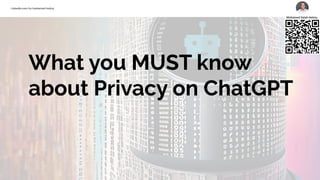What you MUST know about Privacy on ChatGPT - Mohamed Helmy.pdf
- 1. Linkedin.com/in/mohamed-helmy Linkedin.com/in/mohamed-helmy What you MUST know about Privacy on ChatGPT
- 2. Linkedin.com/in/mohamed-helmy Linkedin.com/in/mohamed-helmy Conversation may be read by AI trainers In my recent survey, 57% of people didn't know that real humans - aka AI trainers - can read their conversations, although it's one of the hints you get when you ’¼ürst sign up. As data privacy concerns continue to rise, a new discussion has emerged regarding the risks of sharing con’¼üdential information with AI-based chatbots like ChatGPT. While the technology has made strides in various ’¼üelds, its potential drawbacks can't be ignored.
- 3. Linkedin.com/in/mohamed-helmy Linkedin.com/in/mohamed-helmy Con’¼üdential information is being shared through ChatGPT conversations In a recent example involving Samsung, con’¼üdential information was unintentionally shared through ChatGPT, raising concerns about the potential risks of using AI-based platforms. Samsung's response was to limit employee access to the AI, a move that signals the increasing need for organizations to prioritize data privacy. Another privacy concerns were raised in Italy by the countryŌĆÖs data protection watchdog, followed by a ban of the tool in Italy.
- 4. Linkedin.com/in/mohamed-helmy Linkedin.com/in/mohamed-helmy Who owns your ŌĆ£inputŌĆØ and AIŌĆÖs ŌĆ£outputŌĆØ As highlighted by Senior Council Samantha Schonfeld on LinkedIn, there are legal implications associated with AI-generated content. As per the terms; the user owns any ŌĆ£InputŌĆØ provided to ChatGPT as well as any ŌĆ£OutputŌĆØ that ChatGPT provides in response. However, ŌĆ£OpenAI may use Content [de’¼üned as Input and Output] as necessary to provide and maintain the Services. We need to ask: Who is responsible for mistakes made by AI? Can these errors lead to copyright infringement or other legal liabilities?
- 5. Linkedin.com/in/mohamed-helmy Linkedin.com/in/mohamed-helmy Action Plan 1 Blocking ChatGPT (Plugins) with Robots.txt To implement this, simply add the following lines to your robots.txt ’¼üle: User-agent: ChatGPT Disallow: / User-agent: ChatGPT-User Disallow: / This will prevent the AI plugins from crawling and accessing your website's content, until there's a clear revenue-sharing model between OpenAI and Content providers. 2 Stop ChatGPT from Reading Conversations Request to opt-out of having your data used by ’¼ülling out this form with your organization ID and email address associated with the owner of the account. This applies to both individuals and companies. You can also; 1. Delete any sensitive or con’¼üdential information from your conversation history. 2. Avoid sharing sensitive information in future conversations.
- 6. Linkedin.com/in/mohamed-helmy Linkedin.com/in/mohamed-helmy Stay Safe 1 Educate your team Ensure that everyone in your organization understands the risks and best practices associated with AI platforms like ChatGPT. 2 Establish clear guidelines Develop a set of rules for using ChatGPT. This might include outlining acceptable use cases, specifying who has access, and providing instructions for reporting any issues. 3 Monitor usage Regularly review how ChatGPT is being used within your organization to ensure compliance with established guidelines and to identify any potential risks.




![Linkedin.com/in/mohamed-helmy
Linkedin.com/in/mohamed-helmy
Who owns your ŌĆ£inputŌĆØ and
AIŌĆÖs ŌĆ£outputŌĆØ
As highlighted by Senior Council Samantha Schonfeld on
LinkedIn, there are legal implications associated with
AI-generated content. As per the terms; the user owns
any ŌĆ£InputŌĆØ provided to ChatGPT as well as any ŌĆ£OutputŌĆØ
that ChatGPT provides in response. However, ŌĆ£OpenAI
may use Content [de’¼üned as Input and Output] as
necessary to provide and maintain the Services.
We need to ask: Who is responsible for mistakes made by
AI? Can these errors lead to copyright infringement or
other legal liabilities?](https://image.slidesharecdn.com/whatyoumustknowaboutprivacyonchatgpt-mohamedhelmy-230414120058-acf742a6/85/What-you-MUST-know-about-Privacy-on-ChatGPT-Mohamed-Helmy-pdf-4-320.jpg)


